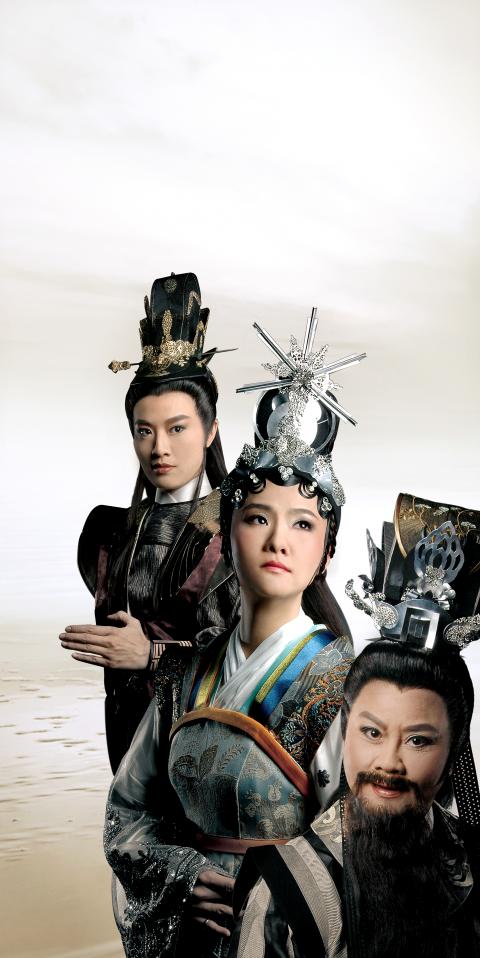In 2009, the Taiwan Bangzi Opera Company scored a huge international success with Bond (約/束), an adaptation of The Merchant of Venice, which was presented at the 4th British Shakespeare Association Conference at the Greenwood Theater of King’s College, Cambridge. The company, which specializes in Henan opera or Yu opera (豫劇), is back with another Shakespearean adaptation, this time of the minor Shakespearian comedy Measure for Measure, renamed Measure, Measure (量。度).
As with the former work, the production is headlined by Perng Ching-hsi (彭鏡禧), one of Taiwan’s foremost Shakespeare scholars and former dean of National Taiwan University’s College of Liberal Arts.
At a press conference announcing the new production, artistic director Wei Kuo-tai (韋國泰) said that the company had selected this lesser known work because of the story, which he believes to be very suitable for adaptation to Bangzi opera. “This is a Shakespeare play that is very rarely performed in Taiwan, but we now have a very strong cast and production team with great experience, so that we can create a great theatrical experience.”

Photo courtesy of Taiwan Bangzi Opera Company
According to Perng, he selected Measure for Measure because it was a story that spoke to him. “As with Merchant of Venice, Measure is a play that is very difficult to produce well. It is very complex, and difficult to get come to grips with. There are many possible interpretations.”
This complexity is part of the appeal of the play for Perng, who has used the story to focus on ideas about the uses of discretion, whether based on reason or emotion, within a judicial system. He said that this was something which is fundamental to the operation of administrative systems around the world, and which gives this play not just a contemporary relevance, but also speaks to particular issues within Taiwan’s own judiciary.
Director Lu Po-sheng (呂柏伸) wrote his master’s thesis on the methodology used by Wu Hsing-kuo (吳興國) of the Contemporary Legend Theater (當代傳奇劇場), a pioneer in the work of incorporating Western works, especially Shakespeare, into the repertoire of Chinese opera. He has since proved his talent following the success of Bond. “Shakespeare has been adapted into many styles of Chinese opera, but often these adaptations never really get beyond the bare bones of the plot. Having a well written script for the opera is very important, for one of the great achievements of Shakespeare is the insight he gives into the hearts and minds of his characters. Professor Perng has chosen plays with considerable intellectual content, and we hope that audiences can enjoy not just a story with many twists and turns, but also come to grips with the moral issues that this play presents. I have set the play up almost as a debate between different [moral] positions.”
The work of adaptation is not restricted to the process of bringing Shakespeare to the east. The Taiwan Bangzi Opera Company is also eager to push the limits of Henan style opera. Diva Wang Hai-ling (王海玲) said that her aim was to incorporate what is best in Henan opera into the presentation of a great story, and added that she had made many challenging adjustments to her performance style to provide the flexibility and the flamboyance to these new productions that got Bond noticed by audiences who might never have heard of Henan opera before.

One of the biggest sore spots in Taiwan’s historical friendship with the US came in 1979 when US president Jimmy Carter broke off formal diplomatic relations with Taiwan’s Republic of China (ROC) government so that the US could establish relations with the People’s Republic of China (PRC). Taiwan’s derecognition came purely at China’s insistence, and the US took the deal. Retired American diplomat John Tkacik, who for almost decade surrounding that schism, from 1974 to 1982, worked in embassies in Taipei and Beijing and at the Taiwan Desk in Washington DC, recently argued in the Taipei Times that “President Carter’s derecognition

This year will go down in the history books. Taiwan faces enormous turmoil and uncertainty in the coming months. Which political parties are in a good position to handle big changes? All of the main parties are beset with challenges. Taking stock, this column examined the Taiwan People’s Party (TPP) (“Huang Kuo-chang’s choking the life out of the TPP,” May 28, page 12), the Democratic Progressive Party (DPP) (“Challenges amid choppy waters for the DPP,” June 14, page 12) and the Chinese Nationalist Party (KMT) (“KMT struggles to seize opportunities as ‘interesting times’ loom,” June 20, page 11). Times like these can

JUNE 30 to JULY 6 After being routed by the Japanese in the bloody battle of Baguashan (八卦山), Hsu Hsiang (徐驤) and a handful of surviving Hakka fighters sped toward Tainan. There, he would meet with Liu Yung-fu (劉永福), leader of the Black Flag Army who had assumed control of the resisting Republic of Formosa after its president and vice-president fled to China. Hsu, who had been fighting non-stop for over two months from Taoyuan to Changhua, was reportedly injured and exhausted. As the story goes, Liu advised that Hsu take shelter in China to recover and regroup, but Hsu steadfastly

You can tell a lot about a generation from the contents of their cool box: nowadays the barbecue ice bucket is likely to be filled with hard seltzers, non-alcoholic beers and fluorescent BuzzBallz — a particular favorite among Gen Z. Two decades ago, it was WKD, Bacardi Breezers and the odd Smirnoff Ice bobbing in a puddle of melted ice. And while nostalgia may have brought back some alcopops, the new wave of ready-to-drink (RTD) options look and taste noticeably different. It is not just the drinks that have changed, but drinking habits too, driven in part by more health-conscious consumers and